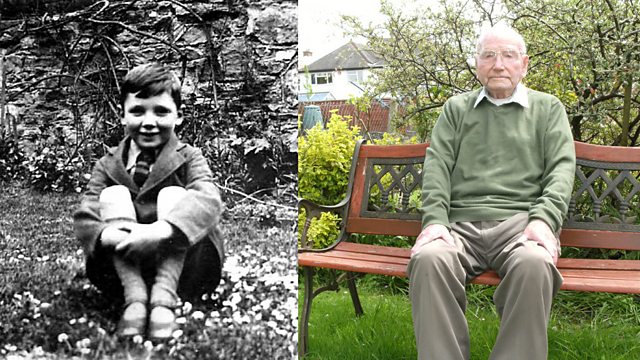Gloucester, Gloucestershire: Childhood Memories 100 Years On
Ralph Hoare looks back at a childhood dominated by the Great War
Ralph Hoare was born in Plymouth on 19 July 1908 and was six when war broke out on 4 August 1914. He was at his Grandfather’s house in Devonport when he was told the news and remembers thinking it would soon be over.
Living between a railway station and army barracks in Plymouth his first memory was of coffins of soldiers being escorted by a military band along his street. Along with his go cart, which he covered in the Union Jack and his teddy bear, he would watch as they made their way past the house. He remembers his uncle visiting the family while he was on leave from the Western Front and bringing with him a mock-up of a shell filled with sweets. He would later be gassed before returning to his native Canada.
He also talks about warnings of Zeppelin bombers and being told to hide under the kitchen table with a cushion on his head and the time when during a church service the preacher stopped the proceedings to warn the congregation of a possible attack. It caused chaos with people rushing out of the church, climbing over railings and being injured in the process. There were two key battles during the war that he remembers, those being the Battle of Jutland, and Hill 60 being recaptured by the Allies.
The first raid on England happened at the start of 1915 and from then until the end of the war the German Navy and Army Air Services carried out more than 50 bombing raids, generally referred to as ‘Zeppelin raids’. The airships had the advantage of flying at a higher altitude than could be reached by defending aircraft or anti-aircraft fire, and could carry a significant bomb-load. However, weather conditions and night flying conditions made navigation and bombing accuracy difficult.
The Battle of Jutland was a naval battle fought by the Royal Navy’s Grand Fleet along with ships and personnel from Australia and Canada against the Imperial German Navy’s High Seas Fleet. It was fought on 31 May and 1 June 1916 in the North Sea near Jutland. It was the largest naval battle and the only full-scale clash of battleships in the war. It was only the third-ever fleet action between steel battleships
On the southern flank of the Ypres Salient, Hill 60 was named after the 60 metre contour which marked its boundary. It was created as a result of the digging of the nearby railway cutting but as a result it was a strategically significant area. The hill had been captured by the Germans in 1914 from the French army. One of the unique elements of the fighting at Hill 60 was an intense level of combat underground by engineers and tunnellers on both sides. In the first operation of its kind by the British, six mines were laid by 15 April 1915, and along with others that were unfinished were filled with thousands of tonnes of explosives. The resulting explosions ripped the heart out of the hill sending debris hundreds of feet into the air.
In the days leading up to the end of the war Ralph was injured while playing rugby at school which didn’t deter him from making his way to St Andrews Square to celebrate Armistice Day where hundreds of troops had gathered. With his head bandaged, several of the men came up to him and asked where he’d been wounded - was it at Ypres or on the Somme? In the evening the headmaster of his school lit sparklers and they were each given a cup of cocoa.
Location: 10 Merevale Road, Gloucester, GL2 0QY
Image: Ralph Hoare in the garden of his Plymouth childhood home (left), and at his present home in Gloucester (right)
Duration:
This clip is from
Featured in...
![]()
����ý Radio Gloucestershire—World War One At Home
Places in Gloucestershire that tell a story of World War One
![]()
Memory—World War One At Home
Memorials and the commemoration of wartime lives
More clips from World War One At Home
-
![]()
The loss of HMY Iolaire
Duration: 18:52
-
![]()
Scotland, Slamannan and the Argylls
Duration: 07:55
-
![]()
Scotland Museum of Edinburgh mourning dress
Duration: 06:17
-
![]()
Scotland Montrose 'GI Brides'
Duration: 06:41







